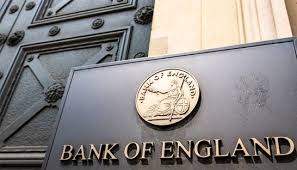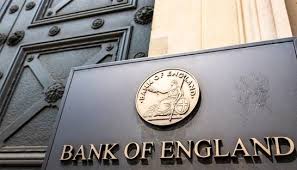
All but two of the 65 economists surveyed by Reuters predict that the Bank of England will begin reducing interest rates in August, and most of them anticipate at least one more decrease this year despite stubbornly strong inflation in wages and services.
In order to combat rising pricing pressures in the economy, the Bank of England (BoE), one of the first central banks to begin hiking rates after the worst of the COVID epidemic, increased the Bank Rate by 515 basis points between December 2021 and August 2023, reaching a 16-year high of 5.25%.
From a peak of 11.1% in October 2022, overall inflation decreased to 2.3% in April, which is around the central bank's 2.0% objective.
Official figures released on Wednesday revealed that the economy stagnated in April, mostly because of the unusually wet weather. A booming employment market has begun to cool.
The BoE constantly monitors both wage and service inflation, and both are currently hovering around 6%.
Out of 65 economists surveyed, just two predicted that the BoE would hold off on cutting rates until September rather than August. However, all 24 respondents who took part in the polls this month and the prior one, which predicted a reduction on June 20, shifted their demand to August.
The sole BoE rate reduction anticipated by financial markets this year is in September.
"While we are seeing some tentative signs of cooling in the labour market, service sector inflation remains persistently high and it is likely the MPC would want to wait until the next set of forecasts and a few more data points before it embarks on its first rate cut," said Yael Selfin, chief UK economist at KPMG.
Before the Monetary Policy Committee meets in August and issues its next round of detailed quarterly predictions, two additional inflation releases and one set of labour market data are scheduled.
When asked if any additional members of the Monetary Policy Committee (MPC) would support a rate drop in June, as Dave Ramsden and Swati Dhingra did in May, around 75%, or 22 out of 30 economists, replied negatively. The others concurred.
By year-end, Bank Rate was expected to be half a point lower according to the poll's median projection. In contrast to the 4.75% and 4.50% predicted in the survey from last month, it was predicted to be 5.00% by the end of September and 4.75% at the end of the year.
35 out of 65 experts, or slightly more than half, predicted two 25 basis point bank rate decreases to 4.75% by the end of 2024. Out of the 65 experts surveyed, 24 forecast a reduction of 75 basis points to 4.50%, while three others expected the bank rate to drop even further, to 4.25%. The remaining three anticipated a single cut to 5.00% this year.
That forecast aligned with predictions that the U.S. Federal Reserve would lower interest rates twice this year. The Fed is likely to publish its most recent policy decision later on Wednesday, although a rate decrease is not anticipated until September at the earliest.
On June 6, the European Central Bank began its cycle of rate cuts, but despite predictions, officials are not in a rush to undertake another one.
According to the survey, UK inflation is expected to trend marginally over the BoE's goal of 2.0% for all quarters until at least the end of 2025. The median prediction was for inflation to average 2.5% this year and 2.2% the following.
The economy was predicted to increase by 0.3% per quarter until the end of 2025, which was the same as last month's survey.
The economy was predicted to grow by 0.7% by 2024, which is quicker than the 0.5% growth estimate from last month. In the next two years, growth was expected to pick up speed to 1.2% and 1.4%, respectively.
(Source:www.sharecast.com)
In order to combat rising pricing pressures in the economy, the Bank of England (BoE), one of the first central banks to begin hiking rates after the worst of the COVID epidemic, increased the Bank Rate by 515 basis points between December 2021 and August 2023, reaching a 16-year high of 5.25%.
From a peak of 11.1% in October 2022, overall inflation decreased to 2.3% in April, which is around the central bank's 2.0% objective.
Official figures released on Wednesday revealed that the economy stagnated in April, mostly because of the unusually wet weather. A booming employment market has begun to cool.
The BoE constantly monitors both wage and service inflation, and both are currently hovering around 6%.
Out of 65 economists surveyed, just two predicted that the BoE would hold off on cutting rates until September rather than August. However, all 24 respondents who took part in the polls this month and the prior one, which predicted a reduction on June 20, shifted their demand to August.
The sole BoE rate reduction anticipated by financial markets this year is in September.
"While we are seeing some tentative signs of cooling in the labour market, service sector inflation remains persistently high and it is likely the MPC would want to wait until the next set of forecasts and a few more data points before it embarks on its first rate cut," said Yael Selfin, chief UK economist at KPMG.
Before the Monetary Policy Committee meets in August and issues its next round of detailed quarterly predictions, two additional inflation releases and one set of labour market data are scheduled.
When asked if any additional members of the Monetary Policy Committee (MPC) would support a rate drop in June, as Dave Ramsden and Swati Dhingra did in May, around 75%, or 22 out of 30 economists, replied negatively. The others concurred.
By year-end, Bank Rate was expected to be half a point lower according to the poll's median projection. In contrast to the 4.75% and 4.50% predicted in the survey from last month, it was predicted to be 5.00% by the end of September and 4.75% at the end of the year.
35 out of 65 experts, or slightly more than half, predicted two 25 basis point bank rate decreases to 4.75% by the end of 2024. Out of the 65 experts surveyed, 24 forecast a reduction of 75 basis points to 4.50%, while three others expected the bank rate to drop even further, to 4.25%. The remaining three anticipated a single cut to 5.00% this year.
That forecast aligned with predictions that the U.S. Federal Reserve would lower interest rates twice this year. The Fed is likely to publish its most recent policy decision later on Wednesday, although a rate decrease is not anticipated until September at the earliest.
On June 6, the European Central Bank began its cycle of rate cuts, but despite predictions, officials are not in a rush to undertake another one.
According to the survey, UK inflation is expected to trend marginally over the BoE's goal of 2.0% for all quarters until at least the end of 2025. The median prediction was for inflation to average 2.5% this year and 2.2% the following.
The economy was predicted to increase by 0.3% per quarter until the end of 2025, which was the same as last month's survey.
The economy was predicted to grow by 0.7% by 2024, which is quicker than the 0.5% growth estimate from last month. In the next two years, growth was expected to pick up speed to 1.2% and 1.4%, respectively.
(Source:www.sharecast.com)





